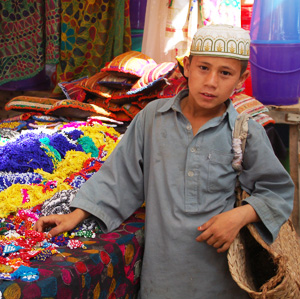
11/16/2012
Rachel Lehr says Afghan women are much less liberated than American women.
“They value interdependence rather than the independence which we value in American culture,” said Lehr, a research scholar and educator of Afghan culture and civility with 25 years of experience in the Middle East.
“So many things are different,” Lehr said. “They have different world views, values, histories …. almost every aspect of life.”
Lehr will speak about the role of women in public and private life in Afghanistan on Thursday, Nov. 15, at SUNY Cortland. Her talk, “Women Mending Afghanistan,” begins at 7 p.m. in Brockway Hall Jacobus Lounge. The event is free and open to the public.
The talk is part of the College’s yearlong “In/Common” event series presented by the Cultural and Intellectual Climate Committee (CICC). The “In/Common” series includes a number of book readings, film screenings and discussion topics all focusing on the common humanity shared by peoples across the globe as well as their ethnic and socio-economic divides.
The discussion will bring attention to aspects of Afghan culture underrepresented in the 2003 novel by Khaled Hosseini, The Kite Runner.
“By the women being isolated at home, their language and culture is preserved,” Lehr offered as one example of the difference between Afghan and western women.
Currently a doctoral candidate at the University of Chicago, she has technical expertise in areas of international development. Her two-and-a-half decades of experience have included a research focus on the Middle East, Central Asia and Afghanistan, with extensive field experience in linguistics and ethnography of Afghanistan/ Pakistan.
“I have used my knowledge of the culture in educating American diplomats to prepare for their tour in the Middle East,” Lehr said.
She works with Afghan women through Rubia, a New Hampshire-based, non-profit organization that helps Afghan women translate their craft heritage and textile skills into sustainable livelihoods and economic development opportunities.
Lehr said she became interested in these cultures due to a personal life experience and her undergraduate study of the languages. She chose to become an educator because of what she encountered during the time spent with women of these cultures and her interest in their differences with Americans.
The lecture is funded by the offices of the President and the Provost and Vice President for Academic Affairs; the Brooks Museum; and the James M. Clark Center for International Education.
More information on Rachel Lehr and the Rubia non-profit organization is available at www.rubiahandwork.org. For more information regarding the series’ events, contact Scott Moranda, chair of the CICC and an associate professor of history, at (607) 753-2052.